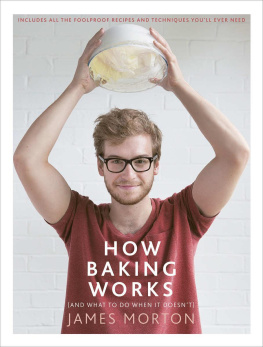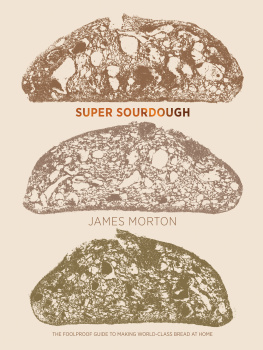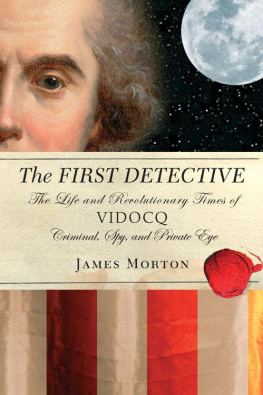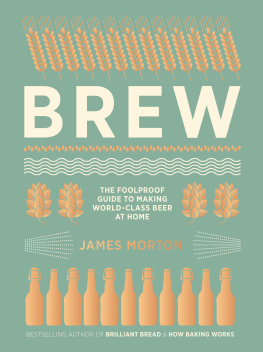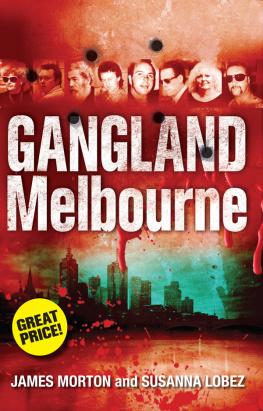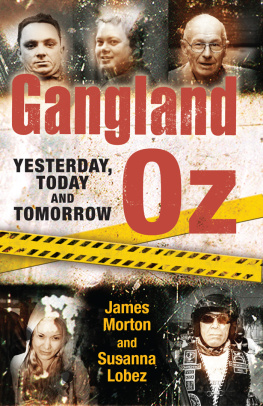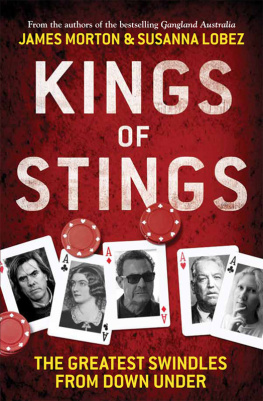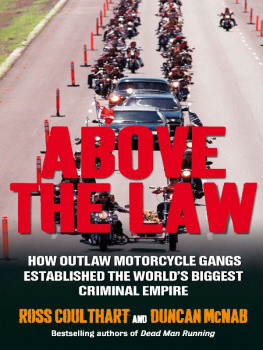Gangland
QUEENSLAND
Gangland
QUEENSLAND
James Morton
Susanna Lobez
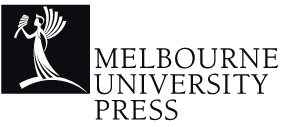
Contents
Introduction
On 6 November 1867 police officers Patrick W Cahill and John F Power were shot and killed by conman and gold commissioner Thomas Griffin, while escorting between Clermont and Rockhampton gold and currency valued at 8000.
On 29 May 2011 Detective Senior Constable Damian Leeding was shot in the face at close range after he attended a triple-0 call to a robbery and hostage that were taking place at the Pacific Pines Tavern on Queenslands Gold Coast. Later his family agreed that his life support machine be turned off. The police then launched Operation Seymour, a month-long crackdown on violent crime on the glitter strip.
This, then, is an account of what happened in Queensland between Griffin murdering Cahill and Power, and Leedings death.
Worldwide, authorities are keen to claim there is no criminal Mr Big or Number One on their patches but, if pressed, will reluctantly agree there are a few Mr Big Enoughs. Quite what you have to do to graduate from being Mr Big Enough to Mr Big is difficult to establish. Import more than $5 million worth of heroin? Steal jewellery worth more than $20 million? Kill more than five rivals a year or be downgraded?
This is the story of the Mr Bigs and the Mr (and sometimes Ms) Big Enoughs; a story of murders, robberies, betrayals and sex. In fact, the story of, as a character in the musical Irma la Douce remarked, everything that makes life in the underworld worth living. It is the story of 1920s standover men such as Curley ODea, and his wife Lizzie, and the English-born George Tich Brett; of such safecrackers as James Short The Mastermind of the Northern Gangs, whose offsiders tried to blow up his prosecutor to avoid a trial; of sly-groggers and brothel keepers, such as Mavis Cooke; of the girls, like Pretty Dulcie Markham and the multi-talented Vera Purdy, who worked for them; and of such white-slavers and Italian Black Handers as Francisco Femio and Vincenzo DAgostino.
Criminals in generaland many others, for that matterwill claim that the most organised criminals are crooked police and politicians. This is the story about their corruption: of the Police Commissioner and bludger Frank Bischof, of the English-born bagman Jack Herbert and the so-called Rat Pack. This is also the story of those journalists, like Phil Dickie and Chris Masters, who struggled to expose their control over the SP bookmakers and brothel keepers of the post-World War II years. And then there are the bikers who are alleged to control the sale of methamphetamines, and the drug importers, such as Snapper Cornwell, who flooded the state and the rest of Australia with heroin and cocaine. As well, there are such killers as the Angry Gang, a group of prisoners who murdered their fellow inmates towards the end of the twentieth century; and the great escapers, like Brendan Abbott.
We have restricted ourselves to organised, rather than domestic, crime and so can only make brief mention here of Frederick William Everest, the returned soldier and bread delivery man who was convicted of the Brisbane murders of two American servicemen: Lieutenant Allan C Middleton, on 11 January 1945, and Chief Petty Officer John Daniel McCollum, fourteen days after the fact. Middleton was shot in a public lavatory and McCollum was shot when he opened the door of a house he was renting in Alderley. He managed to tell the police of a red bread van, which was traced to a few streets away. When questioned, Everest claimed to believe he was to be poisoned by Americans and his were pre-emptive strikes. Yes, I shot him. The Yanks have been after me for some time. He was sent to a mental asylum.
Or, indeed, in a similar vein, there is German-born Siegfried Karl Kast, who, on 1 December 1955, rampaged through Wickham Terrace in Brisbane, killing and maiming, before blowing himself up. He had arrived in Australia after jumping ship two months before the outbreak of World War II. He claimed to be a refugee and a member of the illegal German Social Democratic Party. He escaped four times from an internment camp in Gaythorne, Queensland, before, in 1944, he was allowed to join the Aliens labour party. He was described as a malingerer and someone who seemed to want to cause as much disruption as possible. There were suggestions that Kast may have been a German spy during the war. After it ended, he became variously a prospector, mine worker and salesman.
In the early 1950s, he tried to get a doctors certificate in order to obtain government payment for a back injury but none of the nine he approached would sign it. He then spent some time making bombs out of water-piping and gelignite. By the time he went to Wickham Terrace, he had with him over a hundred rounds of ammunition and a satchel of home-made pipe-bombs. He first shot Dr Michael Gallagher, who survived. He then killed Arthur Meehan and Andrew Russell before going after John Lahz, who escaped. A racehorse trainer, George Boland, lost several fingers trying to smother a bomb. Finally, Kast blew himself up.
Readers may wonder why the Whisky Au Go Go fire has a chapter devoted to it when the fire at Palace Backpackers Hostel in Childers, 54 kilometres south of Bundaberg, that killed fifteen does not. The answer is that the man responsible, Robert Paul Long, was a fantasist and alcoholic, who claimed that, rather than being a figure in organised crime, he was dying of lung cancer, and that his non-existent, wife and children had died in fires or accidents. Around 12.30 a.m. on 23 June 2000, 38-year-old Long, who had been staying at the hostel but had left owing money for drink, torched it. The fire started in a downstairs television room and quickly spread. Seventy survived. Almost immediately, Long was named the culprit by his former de facto Christine Campbell, who claimed he had tried to burn her and her children in a Darwin caravan park three years earlier. This matter had been reported but Long had not been charged. He was caught five days after the fire, after a struggle with the police in which he tried to stab one of their dogs, and received a twenty-year sentence.
In 2003 Longs appeal against the conviction was dismissed, as was the attorney-generals appeal that his twenty-year minimum sentence be extended to twenty-five-years.
On the basis that blood is more interesting than paper trails, we have not included such white-collar criminals as Christopher Skase, but one of the great rorts of the Australian turf cannot go unmentioned. In 1984 the well-known Gold Coast conman John The Phantom Gillespie, who in his lifetime racked up over 300 convictions, bought Dashing Solitaire as a ring-in for the poor plateror slow horseFine Cotton at Eagle Farm. Unfortunately, shortly before the race, Solitaire went lame and, rather than abort the coup, the smart Bold Personality was substituted. It was a hare-brained scheme. Bold Personalitys colouring was in no way similar to that of Fine Cottonone was almost black and the other redand a bad dye and paint job did not help. Running as Fine Cotton, and backed down from 33/1 to 7/2, he won by a short, short head from Harbour Gold but, by the time he walked to the unsaddling enclosure, the crowd was already shouting ring-in. The race was awarded to Harbour Gold but the stewards ordered the bets to stand, causing the backing syndicate substantial losses. In the wash-up, Gillespie, who claimed to have made $1.8 million from the rort, received four years and the trainer, New Zealander Haydon Haitana, got twelve months, of which he served six. Seven peopleincluding two prominent bookmakers, Robbie and Bill Waterhouse from the well-known racing family, and Roman Catholic priest Father Edward ODwyer, who had plunged on the horse while he was at Kempsey dogswere warned off. Haitana later wrote of himself, Some have a weakness for drink, some for women, some for the punt and some for the conbut Im lucky. I got the lot. He also said that he had gone ahead with the rort because he was afraid he or his brother Pat would be beaten up, or even killed, as trainer George Brown had been the previous year. The man behind the Fine Cotton ring-in was said to have been the Sydney identity and drug dealer Michael Sayers, who was himself shot dead in February 1985.
Next page

